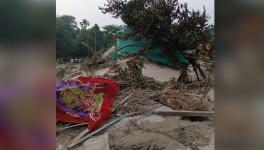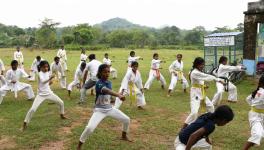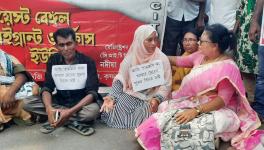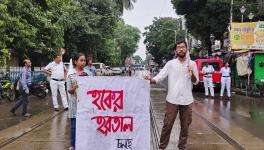West Bengal: AIFFWF, Other Fisher Organisations Oppose Bid to Build Missile Launch Pad
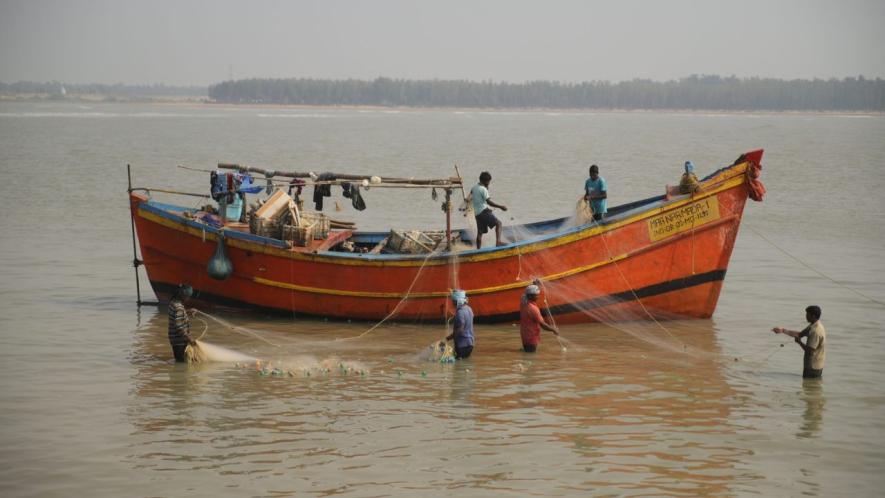
Representational Image. Image Courtesy: PixaHive
Kolkata: The All India Fishers And Fisheries Workers' Federation and the Dakshin Banga Matshajibi Forum, an organisation of small fishers of West Bengal, have strongly opposed the move to build a missile launching pad at Junput in the state’s Digha coastal area.
The missile launching pad, if it materialises, will hamper the entire ecosystem of the area and directly hurt over 10,000 fisherfolk employed through the fish landing harbour of Junput, locally known as Matsya Khuti, the organisations alleged.
The project is coming up at Kathi 1 blocks’ Biramput Mouza -583 plot, which falls under the biodiversity heritage site. The project feasibility report or its environmental impact assessment report has still not been shared with the public, though work on the launching pad is going at full swing, according to sources.
According to news reports, the Defence Research and Development Organisation (DRDO) recently announced that it would launch a missile test from West Bengal’s coast in February end or early March.
The AIFFWF also feared that the project would hamper the livelihood of about two lakh fisherfolk who go into the ocean, as well thousands of those allied with fish trade in the area.
It alleged that even the state government was not raising any voice against the “flouting of environment norms”, adding that it was “sad situation in the state of West Bengal.”
“No one seems to care about small fishers in the state who earn a huge revenue for the state government every year, such as from exports of dried fish,” said Debasish Barman, the national president of AIFFWF.
He told NewsClick that the way rules were being flouted for setting up of the missile launching pad was exemplary in nature. “We will take up this matter in our next national executive meeting on February 22, and will demand immediate scrapping of the project”, he added.
The Dakshin Banga Matsajibi Forum, which is also opposing the setting up of the missile launch pad, expressed concern that the new initiative could lead to the loss of over a lakh indirect jobs related to fish trade in the area.
“From Tajpur to Junput on the eastern coast, there are 22 fishing harbours (khuti), and about two lakh fishermen and fish traders are directly dependent on it for their living,” it said.
Tajpur, Shankarpur, Jaldah, Mandarmani (Dadanpatrabhar), Kharpai, Shoula Chemasuli, and Junput Khuti fall in the area of the proposed project. The livelihoods of lakhs of fishermen are closely linked to these fishing harbours. Some use the land for drying fish, which is then sent to different parts of the country, especially to Assam.
“Crores of rupees are earned every day in this trade in the vibrant khutis (Fish Landing Harbours) of the region. With the one stroke of a pen, all our livelihoods cannot be taken away,” said Debasish Shyamal of Dakshin Banga Matsajibi Forum.
The proposed area also falls under the CRZ or the Coastal Regulation Zone regulation, he said, outlining that of the 25 coastal blocks of Eastern Medinipore district, nearly four lakh people are directly associated with the fish trade. An income of Rs 6 crore a day or Rs 180 crore a month is usually generated from fishing trade in this district alone. Creating a deep sea port infrastructure is likely to become the source of tribulation for the fishing community and the fishing harbours, he added.
The AIFFWF claimed that inland water and marine fisherfolk working in the coastal areas of West Bengal were facing eviction threats due to the "detrimental policies" of the Central and state governments.
It also alleged that "hooligans" associated with the ruling Trinamool Congress (TMC) were taking over fisherfolk cooperatives “by force” and were “inviting big companies to fish in the inland water bodies.”
“As a result, the livelihood of the 13.65 lakh-strong fisherfolk community in the state has been endangered,” said the organisation, adding that prior to 2011 (during Left Front rule), West Bengal used to be a “topper among the states in fish production, but is now producing only 4,857 tonnes daily, though the daily requirement of the state is 4,940 tonnes.”
To fulfil the demand, fish was now being imported from Andhra Pradesh and Chhattisgarh.
The AIFFWF, also highlighted the eviction of 2,250 families of fisherfolk, involved in small-scale fishing, from a lake spread over 10,187 acres, and accused the TMC men of “forcibly taking over cooperatives such as Choto Paresh and Boro Paresh of the Bidhannagar area. “
Cooperatives of fisherfolk formed when Left Front was governing the state have been shut by the TMC with the help of policies of the state government, the AIFFWF said in a report.
A total of 1,271 such fisherfolk cooperatives, 200 communes, 3,600 hilly streams fisherfolk units, 131 marine fisherfolk communities, 41 salt fisheries units, and fisherman communities living in North Bengal's Kajipara lake, Jalpaiguri, Siliguri, and Cooch Behar have been evicted from their workplaces, it stated.
More than 600 fisherfolk cooperatives have become redundant and stopped working as a result of this and also due to the detrimental law and order situation in the state, as per the AIFFWF.
“The Centre is harming the ecology of the Sundarbans and hampering fishing in the area by allowing passage to ships. The Blue Revolution is meant for big corporate entities. We will not benefit from it,” said, who is also a member of the Hingalgunj Fishermen Community.
Get the latest reports & analysis with people's perspective on Protests, movements & deep analytical videos, discussions of the current affairs in your Telegram app. Subscribe to NewsClick's Telegram channel & get Real-Time updates on stories, as they get published on our website.










